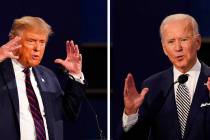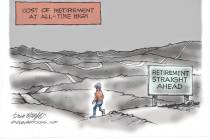President Hermaphrodite
Return with us now to those thrilling days of yesteryear, when men were men, women were women and presidents were hermaphrodites.
Huh?
Well, that seems to be the wish of a couple of scribblers in a recent Washington Post article.
John Nichols and Robert McChesney bemoan the decline and presumed eventual death of American newspapers. They quote President Obama as saying, "I am concerned that if the direction of the news is all blogosphere, all opinions, with no serious fact-checking, no serious attempts to put stories in context, that what you will end up getting is people shouting at each other across the void but not a lot of mutual understanding."
The two writers claim the present marketplace kills 1,000 journalism jobs a month, and call for a financial model to pay journalists to "question, analyze and speak truth to power."
Nichols and McChesney anguish over the "prospect that this 'information age' could be characterized by unchecked spin and propaganda, where the best-financed voice almost always wins, and cynicism, ignorance and demoralization reach pandemic levels, is real. So, too, is the threat to the American experiment."
Their answer to this dystopian vision is as old as the First Amendment itself: federal subsidies.
Nichols and McChesney correctly report that the post-colonial press was sustained by postal jobs and printing contracts from various levels of government.
"The first generations of Americans never imagined that the market would provide sound or sufficient journalism," they write. "The notion was unthinkable. They established enlightened subsidies, which broadened the marketplace of ideas and enhanced and protected core freedoms. Their initiatives were essential to America's progress."
They neglect one niggling little problem with those "enlightened subsidies." The post-colonial press was beholding to its benefactors and, as such, was notoriously partisan, vicious and subjective to the core.
There was no incentive for fact-checking or putting stories in context. Those papers were much like the benighted blogosphere, full of spin and propaganda and shouting across the void.
A cursory perusal of early journals reveals a propensity for scandal and slavish loyalty to the person holding the purse strings. Even Thomas Jefferson financially supported the newspaper writings of the likes of James Callender and Philip Freneau, who aggressively and often savagely attacked George Washington, John Adams and Alexander Hamilton.
For his part Hamilton used newspaper editor John Fenno to do his bidding.
When Jefferson was secretary of state, he hired Freneau as a translator and assured him government printing contracts, as well as insider information for his National Gazette newspaper.
Meanwhile, Hamilton used his post as secretary of the Treasury to funnel printing contracts to Fenno's Gazette of the United States.
From their respective sinecures the two editors exchanged calumnies, epithets and slanders.
Fenno's paper printed a letter describing the competition as "the tool of a faction, and the prostituted vehicle of party spleen and opposition to the great principles of order, virtue, and religion."
Freneau's called Fenno a "vile sycophant" and said Hamilton's policies were "pregnant with every mischief."
But Callender was probably the most infamous of the era's scribblers, partly because he changed sides depending on his patron of the nonce.
While under the wing of Jefferson's Republicans, he wrote about Hamilton's affair with Maria Reynolds. After a falling out with Jefferson, he wrote about the president's alleged dalliance with the "African Venus" Sally Hemings, who he noted had a son named Tom whose "features are said to bear a striking resemblance to those of the president himself."
Fenno suggested Callender was responsible for "sufficient slander on our country to entitle him to the benefit of the gallows."
Actually, Callender was the beneficiary of a jail cell during the Adams administration for violating the Sedition Act.
Perhaps that is why Callender accused Adams of having a "hideous hermaphroditical character, which has neither the force and firmness of a man, nor the gentleness and sensibility of a woman."
Nichols and McChesney are co-authors of an upcoming book called "The Death and Life of American Journalism." I won't fail to miss it.
Many of the descriptions of the subsidized colonial press' antics reported above can be found in Eric Burns' book "Infamous Scribblers: The Founding Fathers and the Rowdy Beginnings of American Journalism."
A subsidized press is hardly the answer to what ails modern journalism. No man, nor journalist, can serve two masters -- his readers and his benefactor.
Thomas Mitchell is editor of the Review-Journal and writes about the role of the press and the need for access to public records and meetings. He may be contacted at 383-0261 or via e-mail at tmitchell@reviewjournal.com. Read his blog at lvrj.com/blogs/mitchell.























